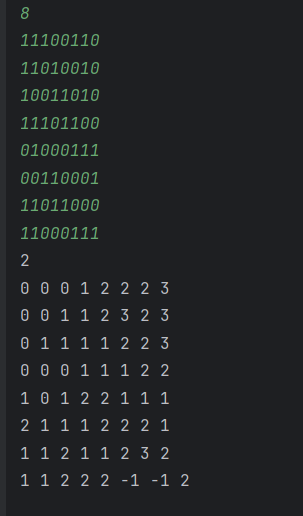[Algorithm/Java] 백준 2665번 - 미로만들기
https://www.acmicpc.net/problem/2665
🔍 문제 풀이
알고리즘 선택
다익스트라 vs 0-1 BFS vs BFS
- 다익스트라: 일반 가중치 그래프 최단 경로 -> pq 필요
- 0-1 BFS (Deque BFS): 비용이 0 또는 1일 때 최단 경로 찾기 -> deque로 더 빠르게 처리 가능
- BFS는 단순하게 모든 간선 비용이 동일할 때 사용
💡 Dijkstra를 사용해도 해결 가능하지만, 비용이 0 또는 1일 경우에는 0-1 BFS가 더 효율적이라고 한다.
이 문제는 흰 방(이동 비용 0)과 검은 방(이동 비용 1)이 섞인 가중치가 있는 최단 경로 문제이므로, 다익스트라 또는 0-1 BFS를 사용해야 한다.
- 0-1 BFS:
- 흰 방으로 이동하는 비용 0인 경로는 Deque의 앞에 넣고, 검은 방으로 이동하는 비용 1인 경로는 Deque의 뒤에 넣어 항상 비용이 낮은 경로를 먼저 탐색하도록 보장
- Deque를 사용해 BFS처럼 탐색하지만, 비용 0은 앞, 비용 1은 뒤에 넣어 최소 비용 우선 탐색
- 비용 0(흰방):
offerFirst() - 비용 1(검은방):
offerLast()
- 비용 0(흰방):
- 다익스트라:
- 우선순위 큐를 사용하여 현재까지 최소 비용인 노드를 선택하고, 인접 노드 비용 갱신
- 최소 비용 노드부터 선택하며 탐색
- 모든 간선 가중치가 0 이상이어야 사용 가능

💻 코드
0-1 BFS (Deque BFS)
비용 0 (흰 방)
- 이동해도 비용이 늘지 않으므로, 가장 짧은 경로일 가능성이 높다.
- 따라서
dq.offerFirst()를 사용하여 큐의 맨 앞에 넣어 다음 탐색 순서에서 우선적으로 처리되게 한다.
비용 1 (검은 방)
- 벽을 부숴야 하므로 비용이 1 증가
- 따라서
dq.offerLast()를 사용하여 큐의 맨 뒤에 넣어 비용 0인 노드들이 모두 처리된 다음 순서에 처리되게 한다.
import java.io.*;
import java.util.*;
public class Main {
static int[][] arr;
static int[][] cost; // 흰 방으로 바꾸는 횟수 저장
static int[] dx = {-1, 1, 0, 0};
static int[] dy = {0, 0, -1, 1};
static int n;
public static void main(String[] args) throws IOException {
BufferedReader br = new BufferedReader(new InputStreamReader(System.in));
// input
StringTokenizer st = new StringTokenizer(br.readLine());
n = Integer.parseInt(st.nextToken());
arr = new int[n][n];
cost = new int[n][n];
for(int i=0; i<n; i++){
Arrays.fill(cost[i], -1); // 까먹지 말기
}
for(int i=0; i<n; i++) {
String line = br.readLine();
for(int j=0; j<n; j++){
arr[i][j] = line.charAt(j) - '0';
}
}
// solve
int ans = bfs(0, 0);
// output
System.out.println(ans);
}
static int bfs(int x, int y){
// 1. 초기화
Deque<Node> dq = new ArrayDeque<>();
// 2. 초기값
dq.offer(new Node(x, y, 0));
cost[x][y] = 0; // 초기 비용
// 3. 탐색
while(!dq.isEmpty()) {
Node cur = dq.pollFirst();
// 종료조건
if(cur.x == n-1 && cur.y == n-1) {
return cur.cnt;
}
// 4방향, 범위
for(int d = 0; d<4; d++){
int nx = cur.x + dx[d];
int ny = cur.y + dy[d];
if(nx < 0 || nx >= n || ny < 0 || ny >= n) continue;
// 1. 다음 칸의 비용을 먼저 계산
int nextCnt = cur.cnt + (arr[nx][ny] == 0 ? 1 : 0);
// 2. 최소 비용 갱신 조건
// 이미 방문한 곳이라도 더 적은 비용으로
// 도달할 수 있다면 다시 방문하여 비용을 갱신
if(cost[nx][ny] == -1 || cost[nx][ny] > nextCnt) {
cost[nx][ny] = nextCnt; // 새로운 최소 비용으로 갱신
// 가중치에 따라 dq의 앞/뒤에 추가
if(arr[nx][ny] == 0) { // 흰 방 (비용 0) -> Deque의 앞에 넣어 우선 처리
dq.offerLast(new Node(nx, ny, nextCnt));
}
else { // 검은 방 (비용 1) -> Deque의 뒤에 넣어 나중에 처리
dq.offerFirst(new Node(nx, ny, nextCnt));
}
}
}
}
return -1;
}
static class Node {
int x, y, cnt;
Node(int x, int y, int cnt) {
this.x = x;
this.y = y;
this.cnt = cnt;
}
}
}
다익스트라
나중에 다익스트라로 구현해볼것
| [백준 2665 | 미로만들기 (BFS, 우선순위 큐)](https://velog.io/@whddn0221/%EB%B0%B1%EC%A4%80-2665-%EB%AF%B8%EB%A1%9C%EB%A7%8C%EB%93%A4%EA%B8%B0-BFS-%EC%9A%B0%EC%84%A0%EC%88%9C%EC%9C%84-%ED%81%90) |
스켈레톤 코드 (0-1 BFS)
import java.io.*;
import java.util.*;
public class Main {
static int[][] arr;
static int[][] cost; // 흰 방으로 바꾸는 횟수 저장
static int[] dx = {-1, 1, 0, 0};
static int[] dy = {0, 0, -1, 1};
static int n;
public static void main(String[] args) throws IOException {
BufferedReader br = new BufferedReader(new InputStreamReader(System.in));
// input
StringTokenizer st = new StringTokenizer(br.readLine());
n = Integer.parseInt(st.nextToken());
arr = new int[n][n];
cost = new int[n][n];
for(int i=0; i<n; i++){
Arrays.fill(cost[i], -1); // 까먹지 말기
}
for(int i=0; i<n; i++) {
String line = br.readLine();
for(int j=0; j<n; j++){
arr[i][j] = line.charAt(j) - '0';
}
}
// solve
int ans = bfs(0, 0);
// output
System.out.println(ans);
}
static int bfs(int x, int y){
return -1;
}
static class Node {
int x, y, cnt;
Node(int x, int y, int cnt) {
this.x = x;
this.y = y;
this.cnt = cnt;
}
}
}

댓글남기기